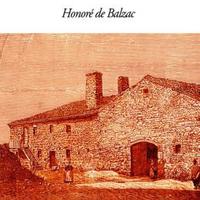07. Honoré de Balzac. L'Auberge rouge. Partie 7/9.
Ma voisine me poussa le pied, et me fit un signe en me montrant monsieur Taillefer. L'ancien fournisseur avait négligemment laissé tomber sa main sur ses yeux ; mais, entre les intervalles de ses doigts, nous crûmes voir une flamme sombre dans son regard.
– Hein ? me dit-elle à l'oreille. S'il se nommait Frédéric.
Je répondis en la guignant [1] de l'œil comme pour lui dire : « Silence ! Hermann reprit ainsi :
– Frédéric, s'écria le sous-aide, Frédéric m'a lâchement abandonné. Il aura eu peur. Peut-être se sera-t-il caché dans l'auberge, car nos deux chevaux étaient encore le matin dans la cour.
– Quel incompréhensible mystère, ajouta-t-il après un moment de silence. Le somnambulisme, le somnambulisme ! Je n'en ai eu qu'un seul accès dans ma vie, et encore à l'âge de six ans.
– M'en irai-je d'ici, reprit-il, frappant du pied sur la terre, en emportant tout ce qu'il y a d'amitié dans le monde ? Mourrai-je donc deux fois en doutant d'une fraternité commencée à l'âge de cinq ans, et continuée au collège, aux écoles ! Où est Frédéric ?
Il pleura. Nous tenons donc plus à un sentiment qu'à la vie.
– Rentrons, me dit-il, je préfère être dans mon cachot. Je ne voudrais pas qu'on me vit pleurant. J'irai courageusement (jusqu') à la mort, mais je ne sais pas faire de l'héroïsme à contretemps, et j'avoue que je regrette ma jeune et belle vie. Pendant cette nuit je n'ai pas dormi ; je me suis rappelé les scènes de mon enfance, et me suis vu courant dans ces prairies dont le souvenir a peut-être causé ma perte.
– J'avais de l'avenir, me dit-il en s'interrompant. Douze hommes ; un sous-lieutenant qui criera : – Portez armes, en joue, feu ! un roulement de tambours ; et l'infamie ! voilà mon avenir maintenant. Oh ! il y a un Dieu, ou tout cela serait par trop niais.
Alors il me prit et me serra dans ses bras en m'étreignant avec force.
– Ah ! vous êtes le dernier homme avec lequel j'aurai pu épancher mon âme. Vous serez libre, vous ! vous verrez votre mère ! Je ne sais si vous êtes riche ou pauvre, mais qu'importe ! vous êtes le monde entier pour moi. Ils ne se battront pas toujours, ceux-ci. Eh ! bien, quand ils seront en paix, allez à Beauvais. Si ma mère survit à la fatale nouvelle de ma mort, vous l'y trouverez. Dites-lui ces consolantes paroles :
– Il était innocent !
– Elle vous croira, reprit-il. Je vais lui écrire ; mais vous lui porterez mon dernier regard, vous lui direz que vous êtes le dernier homme que j'aurai embrassé. Ah ! combien elle vous aimera, la pauvre femme ! vous qui aurez été mon dernier ami.
– Ici, dit-il après un moment de silence pendant lequel il resta comme accablé sous le poids de ses souvenirs, chefs et soldats me sont inconnus, et je leur fais horreur à tous. Sans vous, mon innocence serait un secret entre le ciel et moi.
Je lui jurai d'accomplir saintement ses dernières volontés. Mes paroles, mon effusion de cœur le touchèrent. Peu de temps après, les soldats revinrent le chercher et le ramenèrent au conseil de guerre. Il était condamné. J'ignore les formalités qui devaient suivre ou accompagner ce premier jugement, je ne sais pas si le jeune chirurgien défendit sa vie dans toutes les règles ; mais il s'attendait à marcher au supplice le lendemain matin, et passa la nuit à écrire à sa mère.
– Nous serons libres tous deux, me dit-il en souriant, quand je l'allai voir le lendemain ; j'ai appris que le général a signé votre grâce.
Je restai silencieux, et le regardai pour bien graver ses traits dans ma mémoire. Alors il prit une expression de dégoût, et me dit : – J'ai été tristement lâche ! J'ai, pendant toute la nuit, demandé ma grâce à ces murailles. Et il me montrait les murs de son cachot.
– Oui, oui, reprit-il, j'ai hurlé de désespoir, (et) je me suis révolté, j'ai subi la plus terrible des agonies morales.
– J'étais seul ! Maintenant, je pense à ce que vont dire les autres... Le courage est un costume à prendre. Je dois aller décemment à la mort... Aussi....

